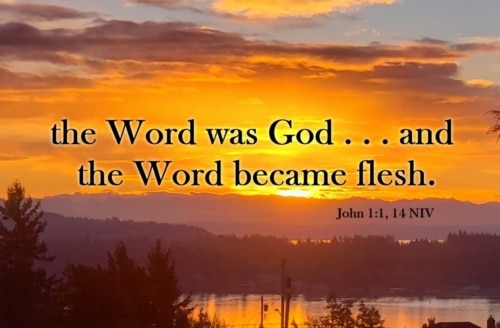In the beginning was the Word, and the Word was with God, and the Word was God. He was with God in the beginning. Through him all things were made; without him nothing was made that has been made. In him was life, and that life was the light of all mankind. . . . The Word became flesh and made his dwelling among us. (John 1:1-4, 14a NIV)
Generally, when we use the term ‘the word,’ we are referring to the Bible. But John used ‘the Word’ to refer to Jesus; Jesus is the Word. John appears to be writing here to combat some early misunderstandings on the nature of Jesus and these first few verses were instrumental in helping to formulate the doctrine of the Trinity as well as the dual nature of Christ. Jesus, as the Word, . . .
- . . . was in the beginning, existing prior to time as God.
- . . . is with God, although in some way distinct from the Father.
- . . . is God. While a distinct person, he is God, not a part of God. He is of one essence with the Father.
- . . . was responsible for all of creation.
- . . . has life in himself. He is the great I AM.
- . . . became flesh. The mystery of the incarnation where God took on human form.
In Jesus’ birth, life, death, and resurrection, we most commonly see the Word as flesh. But he is so much more than that. He is God! He is the true light that gives light to the world (v. 9). He is the Lamb of God who takes away the sin of the world (v. 29). He is worthy of our praise and adoration as our creator and redeemer. We cannot praise him enough.

